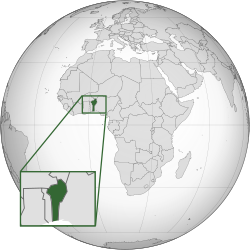
Back Бенин Abkhazian Benin ACE Бенин ADY Benin Afrikaans Benin ALS ቤኒን Amharic Benin AMI Benín AN Benin ANG Bènè ANN
Republic of Benin | |
|---|---|
Motto:
| |
Anthem:
| |
 Location of Benin (dark green) | |
| Capital | Porto-Novoa |
| Largest city | Cotonou |
| Official languages | French |
| National languages | |
| Ethnic groups (2013 Census[1]) | |
| Religion (2015)[2] |
|
| Demonym(s) |
|
| Government | Unitary presidential republic |
| Patrice Talon | |
| Louis Vlavonou[3] | |
| Legislature | National Assembly |
| Independence | |
• Republic of Dahomey established | 11 December 1958 |
• from France | 1 August 1960 |
| Area | |
• Total | 114,763 km2 (44,310 sq mi)[4] (100th) |
• Water (%) | 0.4% |
| Population | |
• 2019 estimate | 11,733,059 (78th) |
• 2013 census | 10,008,749[5] |
• Density | 94.8/km2 (245.5/sq mi) (120th) |
| GDP (PPP) | 2019 estimate |
• Total | $29.918 billion[6] (137th) |
• Per capita | $2,552[6] (163rd) |
| GDP (nominal) | 2019 estimate |
• Total | $11.386 billion[6] (141st) |
• Per capita | $971[6] (163rd) |
| Gini (2015) | high |
| HDI (2019) | low · 158th |
| Currency | West African CFA franc (XOF) |
| Time zone | UTC+1 (WAT) |
| Driving side | right |
| Calling code | +229 |
| ISO 3166 code | BJ |
| Internet TLD | .bj |
| |
Benin (officially called the Republic of Benin) is a country in Africa. The capital of Benin is Porto-Novo. The government is based in Cotonou, the country's largest city. Most people live on the small southern coastline on the Bight of Benin.[9]
Because Benin was colonized by France and is still close to it, the official language of Benin is French. Languages such as Fon and Yoruba are commonly spoken. The largest religious group in Benin is Roman Catholicism. This is followed closely by Islam, Vodun, and Protestantism.
Benin is a member of the United Nations, the African Union, the Organisation of Islamic Cooperation, South Atlantic Peace and Cooperation Zone, La Francophonie, the Community of Sahel-Saharan States, the African Petroleum Producers Association and the Niger Basin Authority.[10]
From the 17th to the 19th century, Benin was ruled by the Kingdom of Dahomey. It was called the Slave Coast by white people from as early as the 17th century, because of the large number of slaves shipped from Porto-Novo, Cotonou, and other ports to European colonies in the Americas.
After slavery was made illegal, France fought a war against Dahomey and took over the kingdom. They renamed it French Dahomey. In 1960, Dahomey gained official independence from France.[11] From 1972 to 1990 a Marxist–Leninist state called the People's Republic of Benin existed. The current Republic of Benin was formed in 1991.[11]
- ↑ "PRINCIPAUX INDICATEURS SOCIO DEMOGRAPHIQUES ET ECONOMIQUES" (PDF). www.insae-bj.org (in French). INSTITUT NATIONAL DE LA STATISTIQUE ET DE L’ANALYSE ECONOMIQUE.
- ↑ http://www.globalreligiousfutures.org/countries/benin/religious_demography#/?affiliations_religion_id=0&affiliations_year Archived 2021-10-17 at the Wayback Machine = 2010
- ↑ "Benin - National Assembly". New Parline: the IPU’s Open Data Platform (beta). 5 July 2018. Archived from the original on 18 May 2022. Retrieved 13 January 2021.
- ↑ Annuaire statistique 2010 (PDF) (Report) (in French). INSAE. 2012. p. 49. Archived (PDF) from the original on 4 March 2016. Retrieved 17 December 2015.
- ↑ "BENIN en Chiffres" [BENIN in Figures]. INSAE (in French). Archived from the original on 17 December 2015. Retrieved 17 December 2015.
- ↑ 6.0 6.1 6.2 6.3 "World Economic Outlook Database, October 2018". IMF.org. International Monetary Fund. Retrieved 1 February 2019.
- ↑ "GINI index (World Bank estimate)". databank.worldbank.org. World Bank. Retrieved 1 February 2019.
- ↑ Human Development Report 2020 The Next Frontier: Human Development and the Anthropocene (PDF). United Nations Development Programme. 15 December 2020. pp. 343–346. ISBN 978-92-1-126442-5. Retrieved 16 December 2020.
- ↑ R. H. Hughes, J. S. Hughes. A directory of African wetlands, p. 301. IUCN, 1992. ISBN 2-88032-949-3
- ↑ "Benin – International Cooperation". Nation Encyclopedia (2010-06-29).
- ↑ 11.0 11.1 Ibp Usa. Global Logistics Assessments Reports Handbook: Strategic Transportation and Customs Information for Selected Countries, p. 85. Int'l Business Publications, 2008. ISBN 0-7397-6603-1

